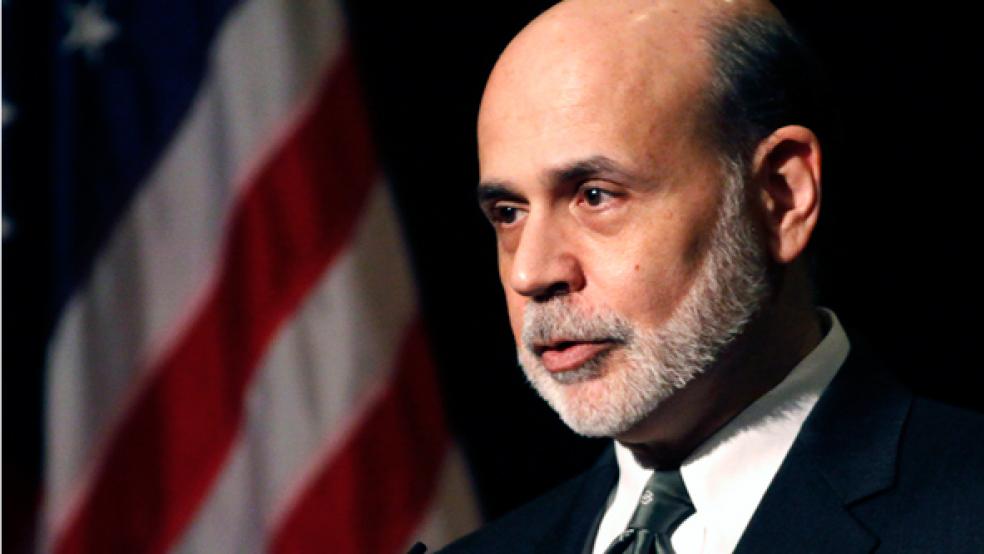Federal Reserve Board chairman Ben Bernanke is used to fending off critics on the right who think the Fed’s massive government bond purchases are sowing the seeds for rapid inflation. He shrugged off Texas Gov. Rick Perry who said things could turn “pretty ugly” if Bernanke showed his face in the Lone Star State.
Lately, however, the Fed chairman’s harshest critics can be found on the left, which is blasting the central bank for being overly concerned about a non-existent inflationary threat while 12.7 million Americans are unemployed, and the unemployment rate remains stuck at 8.2 percent.
Those critics received more grist for their mill Wednesday. The Fed’s latest economic forecast predicts sluggish economic growth of 2.4 to 2.9 percent this year, a slight increase from the 2.2 to 2.7 percent growth rate projected in January. The expected inflation rate for the year, even with food and fast-rising energy prices included, is still only 1.9 to 2.0 percent, which is a small increase from the 1.4 to 1.8 percent projected in January. The Fed’s target rate is 2 percent.
Leading the charge is Bernanke’s former colleague at Princeton University, New York Times columnist Paul Krugman. In a magazine article slated for publication Sunday, the liberal Nobel Prize-winning pundit accuses Bernanke of ignoring his own writings on the lessons of the Great Depression and his analysis of the failures of Japan’s central bank in dealing with its burst property bubble and subsequent downturn.
“Maybe politics are the impediment, and Chairman Bernanke has been forced to hide his inner professor. Or maybe the one-time academic has been assimilated by the Fed Borg and turned into a conventional central banker,” Krugman wrote. “Whichever account you prefer, however, the fact is that the Fed isn’t doing the job many economists expected it to do, and a result is mass suffering for American workers.”
Faced with interest rates that can’t be lowered below zero, Bernanke’s Fed over the past two years has purchased over $2 trillion of government and government-backed mortgage securities to drive down both short and long-term interest rates. It has promised to keep rates near zero through 2014, a pledge repeated Wednesday. “That sounds like a lot, but it’s much less than most analysts think necessary to jump-start economic recovery,” Krugman wrote.
Krugman called on the Fed to adopt a higher inflation target, which most traditional Fed watchers consider anathema. “Higher expected inflation would aid an economy up against the zero lower bound, because it would help persuade investors and businesses alike that sitting on cash is a bad idea,” Krugman said.
Bernanke repeatedly dismisses the notion of raising the inflation target and did so again on Wednesday. His primary concern is that it would undermine the Fed’s “credibility” in financial markets. But he seemed to go one step farther at the press conference by suggesting that between the Fed’s dual mandates of keeping inflation tame and unemployment low, it was the former that carried more weight.
“Does it make sense to seek a higher inflation rate to seek a faster pace of employment,” he asked. “That would be very reckless. To risk that asset (credibility) for what I think is very doubtful and tentative gains would be an unwise thing to do.”
He cautioned that the 2 percent inflation target wasn’t a ceiling and could rise higher temporarily. “It’s a symmetric objective,” he said. “But if inflation were to jump for any reason, we’d try to bring it back.”
On the larger point that the Fed hasn’t done enough to promote full employment, Bernanke suggested he was out of bullets for stoking a faster economic recovery – at least bullets that he is willing to fire. Operation Twist, where the Fed buys long-term bonds like mortgage-backed securities to drive down long-term interest rates, which are at historic lows, expires on June 30. Stopping the program “should have no effect” on rates,” Bernanke said.
Bernanke also sent a clear signal to Congress and the White House that the Fed would be powerless to offset the massive fiscal shock that could hit the economy next January when the Bush-era tax cuts expire and the federal budget will be slashed by $100 billion as the first year’s down payment on the $1 trillion in sequestration cuts contained in the Budget Control Act. “If no action is taken, given the size of the fiscal cliff, the Fed would have no ability to offset an effect of that magnitude,” Bernanke said. “If all the tax increases and spending cuts” go into effect, “that would be a significant risk to the recovery.”





